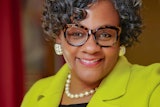I am the daughter of the first Black utilities journeyman lineman in Kentucky, raised by parents who were first generation high school graduates in the segregated South. Although my grandmothers’ education never exceeded elementary school, they taught me more about life than most of my formal training. I reflect on the life lessons they taught me through Southern colloquialisms. I have leaned on these common sense sayings in my professional career more than I have given them shine. It is high time I gave my grannies their posthumous shout out as a frame to my recommendations for historically Black Colleges and Universities (HBCUs). The best lessons they taught me can be summed up in the strategies of wagons, walls, and ducks.
My granny Charles Etta, maternal matriarch, used to say, “Baby that’s yo lil red wagon – you can push it or pull it.” What granny Charles was trying to say was there are some matters that you can simply get behind and some that you have to lead. In the case of the Biden Administration’s plan, it calls for a heightened focus on environmental justice and justice as a workforce development issue. For example, included is a $10 billion investment for a diverse generation of Americans to work conserving our public lands and waters, bolstering community resilience, and advancing environmental justice. Additionally, $12 billion will be invested in funding for workers facing some of the greatest challenges, such as the formerly incarcerated. Penny Smith-Mickey
Penny Smith-Mickey
Not only did HBCUs produce many of the great leaders of the civil rights movement (Dr. Martin Luther King, Jr – Morehouse; John Lewis – Fisk University; Rosa Parks – Alabama State; Medgar Evers – Alcorn State) but these institutions were also the epicenter of important civil rights activities. HBCUs have a history of leading the way and they must continue to lead by push or pull.
In order for other HBCUs to respond to this target highlighted in the American Jobs Act funding, they must consider pushing or pulling their symbolic wagon by highlighting where gaps are already being addressed. Additionally, they must expand with intentionality the degree offerings to determine current programs that can contribute to producing future ready students in the fields such as environmental justice and clean energy.
One promising example of an HBCU that is already positioning their students for in-demand occupations that are directly or indirectly related to environmental or clean energy jobs is at Medgar Evers College (MEC) located in Brooklyn, New York.
MEC with funding from UNCF has created a data analytics minor for non-computer science majors. This minor includes the attainment of multiple certifications or micro-credentials in the high demand, cross industry field of data analytics. Lead professors from the fields of Economics, Environmental Science, English and Computer Information Systems have created a minor study for MEC students who are trained to compete in the area of environmental justice.
Other ways HBCUs can lead by push or pull is to build partnerships with intermediaries. These nonprofits such as Per Scholas or Generation USA can prove to be a symbiotic relationship for HBCUs as their graduates could become a pipeline for the next generation of HBCU students.
Finally, HBCUs must be prepared to ‘pull’ or attract the New Majority Learner. HBCUs have been the educational haven for African Americans, first-generation and low income college students, who statistically outperform the same profile student attending a Predominantly White institution. Based on today’s enrollment numbers, and certainly population trends, the once thought “nontraditional” student represents the new majority of learners today. It is critical that HBCUs acknowledge the influx of students with more complex identities than being African American and first generation college students. The Lab acknowledges that identity is nuanced and fluid and we recommend designing education experiences for intersectional identities that include: color, ethnicity, speaks English as a second language, an immigrant to the United States, formerly incarcerated, have a disability or are neurodivergent. HBCUs should also recognize another cadre of new majority learners defined as “dislocated workers” or individuals who have been terminated, laid off, or who have received a notice of termination or layoff, or is eligible for or has exhausted entitlement to unemployment compensation (especially pandemic unemployment compensation).
Southern idioms serve to communicate complex ideas in a succinct way. Similarly, the Education Design Lab is a nonprofit organization that specializes in the design, testing and implementation of unique higher education models to transform the success of the New Majority Learner. The Lab seeks to continue to support HBCUs as they deploy transformational models that can accelerate their response to the Biden Administration’s American Jobs Act.
Penny Smith-Mickey is the senior educational designer and HBCU Lead for the Education Design Lab. https://eddesignlab.org/project/uncfcareerpathways/















